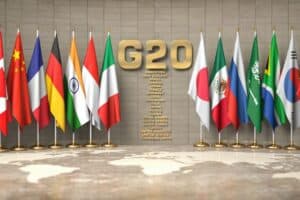Aveng prevented from working on the highest bridge on the continent as desperate contractors appeal to Ramaphosa for help.

Armed “community forums” – widely referred to as the “construction mafia” – are prevalent on virtually all construction sites in the country, and the situation is so bad that engineers prefer to leave South Africa rather than work under such conditions. This is according to WBHO CEO Louwtjie Nel.
Nel spoke to Moneyweb on Monday after the release of the group’s interim results for the six months to December 31, 2018.
His comments came shortly after those of the management of Aveng, which released its interim results on the same day.
Aveng told reporters that staff at its Mtentu Bridge project in the Eastern Cape were threatened by people armed with illegal weapons who wanted to dictate which sub-contractors Aveng should fire and who the company should replace them with.
They said the police in fact escorted the “community forum” members on to the site, and failed to act when the construction group secured interdicts against the alleged perpetrators.
Members of site management were sent threatening messages and followed home, and a female engineer was manhandled, Aveng management said.
Force majeure, contract terminated
Aveng and its joint venture (JV) partner Strabag International GmbH are currently in a legal battle with their client, the South African National Roads Agency (Sanral), to prevent Sanral from calling its performance and retention bonds on the project after the JV terminated the contract based on the force majeure provision.
This came after the site was inaccessible for more than 84 days – the limit in the contract before a party is entitled to terminate it.
Sanral disputed that it was too unsafe for the JV to return to the site and announced that it had terminated the contract from its side.
The JV’s equipment and material are still on site and the staff are in limbo. Aveng executive chairman Eric Diack said the JV would claim demobilisation costs from Sanral.
Aveng management said the JV secured the site at its own cost, but it is difficult to secure equipment and material being moved on to the site or protect staff who live off-site.
‘Our German partners said they have worked in 80 countries, including Afghanistan and Baghdad (Iraq), but have never experienced anything like this,’ said newly appointed Aveng CEO Sean Flanagan.
Flanagan said the threats started in KwaZulu-Natal and spread to the Eastern Cape and further. The situation has now also spread into mining, with three of Aveng’s mining sites, two opencast and one underground, currently being affected.
Aveng CFO Adrian Macartney said construction projects are often situated in extremely rural areas where socio-economic conditions are difficult and expectations among locals that they will benefit from projects are very high.
Bridge ‘cannot be built’ this way
Flanagan added that the Mtentu Bridge – which is set to be the highest bridge ever built in Africa – is a technically complex project, with concrete being poured at a height of 180 metres. It cannot be built with interruptions as caused by these demands, he says.
Aveng management said this was not the kind of thing a contractor could foresee at tender stage or price for. It was outside the control of both contracting parties, which was why the JV declared force majeure.
Nel said WBHO had lost 60 man-days in the past three months due to unrest caused by “community forums”.
He said the group and the industry, through the South African Forum of Civil Engineering Contractors, had appealed to President Cyril Ramaphosa and his cabinet for assistance, and continued to do so.
“There is currently no reasonableness [in the demands],” said Louw.
The police only acted when there was a physical assault – and to get an interdict the complainant has to provide the particulars of the individual perpetrators, which is difficult, added Nel.
Aveng management says the argument is often made that nobody has been seriously injured or killed on site, but the group is not prepared to put its staff at risk and wait until that happens.
Malusi Zondi, president of the Federation for Radical Economic Transformation, which represents a large number of business forums, could not be reached for comment.
* Nel apologised for disappointing shareholders with an 80% drop in headline earnings for the reporting period due to provision for $50 million losses on a roads project in Australia. He said he doesn’t expect further losses from the project and believes that results will be better in the second half of the financial year. WBHO’s UK operations showed profit for the first time, and its order book is at an improved level of R50 billion.
Watch Moneyweb’s interview in September last year with Malusi Zondi, president of the Federation for Radical Economic Transformation:
Brought to you by Moneyweb
Support Local Journalism
Add The Citizen as a Preferred Source on Google and follow us on Google News to see more of our trusted reporting in Google News and Top Stories.






